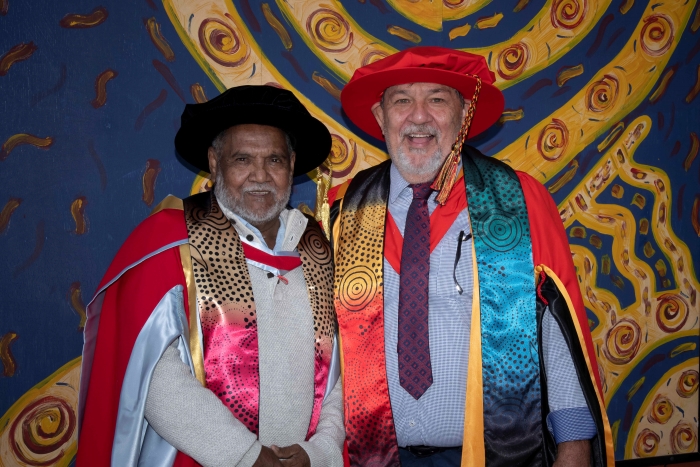Uncle Colin was awarded an Honorary Doctor of Letters Honoris Causa (HonDLitt) at the University of New England’s Autumn Graduation for his longstanding commitment to Aboriginal education as well as his extensive and diverse community involvement. He became one of the first Anaiwan people to be so honoured by the University.
“I was very surprised but incredibly honoured to receive the honorary doctorate from UNE,” Mr Ahoy said. “I’ve always fought for Aboriginal education, especially for young disadvantaged youths, but never expected to be recognised in this manner.”
The award recognises his dedication in removing barriers to education and improving employment outcomes for Aboriginal and Torres Strait Islander people. As UNE’s Elder-in-Residence, Uncle Colin has provided invaluable mentoring for students and extensive cultural advice to UNE.
The honorary award also acknowledges Uncle Colin’s support of the UNE Oorala Aboriginal Centre, and leadership within the local Aboriginal community.
During his three decades at UNE, Uncle Colin has worked as a media resources officer, a laboratory assistant and as staff member for the Information & Technology Rural Development Centre before joining the Oorala Aboriginal Centre.
Together with colleague, Guido Posthausen, he delivered the UNE TRACKS tertiary preparation program to young Indigenous inmates at the Glen Innes Correctional Centre.
“My involvement with young inmates began when I learned of the death of John Pat at the age of 16 at Roebourne prison. I was appalled by what had happened and felt compelled to do something about it,” Mr Ahoy said.
TRACKS won an Australian Universities Teaching Committee Institutional Award for the delivery of educational services in 2001 and saw a number of inmates graduate from UNE.
In 2010, Uncle Colin officially became UNE’s Campus Mentor for Aboriginal and Torres Strait Islander students, providing personal advice and cultural support to Indigenous staff and students across the University.
Three years later, in 2013, Uncle Colin became UNE’s inaugural Elder-in-Residence, a platform that he uses to find authentic ways for Aboriginal and Torres Strait Islander people to engage with, participate in and succeed in tertiary education.
As Elder-in-Residence Uncle Colin contributed to UNE corporate knowledge and was instrumental in developing awareness of cultural protocols, as well as finalising the University’s Reconciliation Action Plan and Aboriginal Employment Strategy.
 Armidale born and bred, Uncle Colin grew up as one of nine children. He is a proud descendant of the Anaiwan people on his mother's side, a Gumbangirr man and a descendant of prominent local Elder Frank Archibald and his wife, Sarah.
Armidale born and bred, Uncle Colin grew up as one of nine children. He is a proud descendant of the Anaiwan people on his mother's side, a Gumbangirr man and a descendant of prominent local Elder Frank Archibald and his wife, Sarah.
“I was mostly raised by my grandmother, Ethel de Silva. She introduced me to Aboriginal politics and inspired me to fight to right past wrongs. I was 16 when she took me to the local Aboriginal Land Council for the first time. That was where I learned about work to return land to the Aboriginal communities and became involved myself. She was my hero.”
Seven years ago, Uncle Colin and colleagues from the Armidale Local Aboriginal Land Council, began to lobby to have ancestral land with Aboriginal cave paintings at Mt Yarrowyck, 20km west of Armidale, returned to the Anaiwan people. On Saturday, 30 April, their hard work came to fruition and the land was formally handed back to the original owners. Under the agreement the land will be leased back to National Parks and remain open to tourists.
In addition to his work with the Armidale Local Aboriginal Land Council and the treatment of young Aboriginal offenders in the justice system, Uncle Colin’s extensive involvement in the community encompasses local radio, sport and the management and protection of local cultural heritage. His strong commitment to community saw him awarded the Local Hero Award in 2010. The award carried $5,000 in prize money which he promptly donated to the Armidale Aboriginal Youth club.
Fighting injustice is a central tenet in Uncle Colin's life. In the seventies, he noticed that talented young football players were consistently missing out on opportunities to progress. Uncle Colin, together with locals Lance Moran and Mitch Morris took it on themselves to find a solution. The result was the Narwan Eels Rugby League club. Established in 1977, it became one of the most successful Aboriginal rugby league teams in country NSW. Narwan remains a true community and family club with most of today’s players following in the footsteps of their fathers, uncles and even grandfathers.
“I will always advocate for improving Aboriginal outcomes, be it in education, employment or sport, and find ways to improve engagement and inclusion,” Uncle Colin said.
Even though his health has deteriorated significantly since being diagnosed with lupus 25 years ago, Uncle Colin remains as committed to Aboriginal advancement as ever, supporting young Aboriginal people to make the most of their lives.


